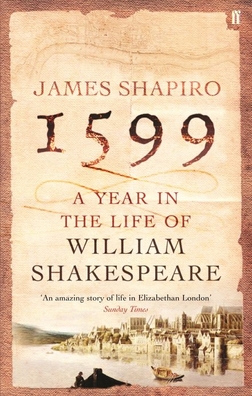Related Research Articles

The Oxfordian theory of Shakespeare authorship contends that Edward de Vere, 17th Earl of Oxford, wrote the plays and poems of William Shakespeare. While historians and literary scholars overwhelmingly reject alternative authorship candidates, including Oxford, public interest in the Oxfordian theory continues. Since the 1920s, the Oxfordian theory has been the most popular alternative Shakespeare authorship theory.

William Shakespeare was an English playwright, poet and actor. He is widely regarded as the greatest writer in the English language and the world's pre-eminent dramatist. He is often called England's national poet and the "Bard of Avon". His extant works, including collaborations, consist of some 39 plays, 154 sonnets, three long narrative poems and a few other verses, some of uncertain authorship. His plays have been translated into every major living language and are performed more often than those of any other playwright. Shakespeare remains arguably the most influential writer in the English language, and his works continue to be studied and reinterpreted.

Delia Salter Bacon was an American writer of plays and short stories and Shakespeare scholar. She is best known for her work on the authorship of Shakespeare's plays, which she attributed to social reformers including Francis Bacon, Sir Walter Raleigh and others.

The Baillie Gifford Prize for Non-Fiction, formerly the Samuel Johnson Prize, is an annual British book prize for the best non-fiction writing in the English language. It was founded in 1999 following the demise of the NCR Book Award. With its motto "All the best stories are true", the prize covers current affairs, history, politics, science, sport, travel, biography, autobiography and the arts. The competition is open to authors of any nationality whose work is published in the UK in English. The longlist, shortlist and winner is chosen by a panel of independent judges, which changes every year. Formerly named after English author and lexicographer Samuel Johnson, the award was renamed in 2015 after Baillie Gifford, an investment management firm and the primary sponsor. Since 2016, the annual dinner and awards ceremony has been sponsored by the Blavatnik Family Foundation.

Irvin Leigh Matus was an independent scholar, autodidact, and author. He is best known as an authority on Shakespeare, but also wrote about aspects of Brooklyn's history such as the Vitagraph Studios, and developed a method of modelling baseball statistics. He was a scholar-in-residence at Shepherd University for the academic year 1992-1993. He was based in Washington, DC.

John Thomas Looney (luni) was an English school teacher who is notable for having originated the Oxfordian theory, which claims that Edward de Vere, 17th Earl of Oxford (1550–1604) was the true author of Shakespeare's plays.

Sir Andrew Jonathan Bate, CBE, FBA, FRSL, is a British academic, biographer, critic, broadcaster, scholar, and occasional novelist, playwright and poet. He specializes in Shakespeare, Romanticism and ecocriticism. He is Regents Professor of Literature and Foundation Professor of Environmental Humanities in a joint appointment in the Department of English in The College of Liberal Arts and Sciences and the School of Sustainability in the Global Futures Laboratory at Arizona State University, as well as a Senior Research Fellow at Worcester College, Oxford, where he holds the title of Professor of English Literature. Bate was Provost of Worcester College from 2011 to 2019. From 2017 to 2019 he was Gresham Professor of Rhetoric in the City of London. He was knighted in 2015 for services to literary scholarship and higher education. He is also Chair of the Hawthornden Foundation.
Charlton Ogburn Jr. was an American writer, most notably of memoirs and non-fiction works. Before he established himself as a writer he served in the US army, and then as a State Department official, specialising in South-East Asian affairs.

The Shakespeare Fellowship was the name used by an organisation devoted to the Shakespeare authorship question. Originally it sought to represent all alternatives to the mainstream consensus that William Shakespeare authored the plays attributed to him, but it later became strongly identified with Oxfordian theory: promoting Edward de Vere, 17th Earl of Oxford, as the true author of the works of Shakespeare. The original organisation is now known as "The Shakespearean Authorship Trust".
The Declaration of Reasonable Doubt is an Internet signing petition which seeks to enlist broad public support for the Shakespeare authorship question to be accepted as a legitimate field of academic inquiry. The petition was presented to William Leahy of Brunel University by the actors Derek Jacobi and Mark Rylance on 8 September 2007 in Chichester, England, after the final matinee of the play I Am Shakespeare on the topic of the bard's identity, featuring Rylance in the title role. As of 23 April 2016, the 400th anniversary of Shakespeare's death and the original self-imposed deadline, the document had been signed by 3,348 people, including 573 self-described current and former academics. As of December 2022, the count stood at 5,128 total signatures.

Note: In compliance with the accepted terminology used within the Shakespeare authorship question, this article uses the term "Stratfordian" to refer to the position that William Shakespeare of Stratford-upon-Avon was the primary author of the plays and poems traditionally attributed to him. The term "anti-Stratfordian" is used to refer to the theory that some other author, or authors, wrote the works.

The Shakespeare authorship question is the argument that someone other than William Shakespeare of Stratford-upon-Avon wrote the works attributed to him. Anti-Stratfordians—a collective term for adherents of the various alternative-authorship theories—believe that Shakespeare of Stratford was a front to shield the identity of the real author or authors, who for some reason—usually social rank, state security, or gender—did not want or could not accept public credit. Although the idea has attracted much public interest, all but a few Shakespeare scholars and literary historians consider it a fringe theory, and for the most part acknowledge it only to rebut or disparage the claims.
Roger A. Stritmatter is a Professor of Humanities at Coppin State University and the former general editor of Brief Chronicles, a delayed open access journal covering the Shakespeare authorship question from 2009 to 2016, now the Brief Chronicles Book series (2019-present). He was a founder of the modern Shakespeare Fellowship, an organization that promotes Edward de Vere, 17th Earl of Oxford, as the true author of the works of William Shakespeare. He is one of the leading modern-day advocates of the Oxfordian theory of Shakespeare authorship, and has been called the “first professional Oxfordian scholar”.
Percy Allen (1875–1959) was an English journalist, writer and lecturer most notable for his advocacy of the Oxfordian theory of Shakespeare authorship, and particularly for his creation of Prince Tudor theory, which claimed that the Earl of Oxford fathered a child with Queen Elizabeth I.
Bernard Mordaunt Ward was a British author and third-generation soldier most noted for his support of the Oxfordian theory of Shakespeare authorship and writing the first documentary biography of Edward de Vere, 17th Earl of Oxford.
Frances Wilson is an English author, academic, and critic.
Katherine Rundell is an English author and academic. She is the author of Impossible Creatures, named Waterstones Book of the Year for 2023. She is also the author of Rooftoppers, which in 2015 won both the overall Waterstones Children's Book Prize and the Blue Peter Book Award for Best Story, and was short-listed for the Carnegie Medal. She is a Fellow of All Souls College, Oxford and has appeared as an expert guest on BBC Radio 4 programmes including Start the Week, Poetry Please, Seriously.... and Private Passions.

1599: A Year in the Life of William Shakespeare is a 2006 book by James S. Shapiro about the life of William Shakespeare in the year 1599. 1599 was the year Shakespeare finished writing Henry V, and wrote Julius Caesar and As You Like It. In addition to detailing Shakespeare's life, Shapiro "delv[es] into evocative details of social, political, and artistic life in London in 1599."
References
- ↑ "James Shapiro". Front Row. March 26, 2010. BBC Radio 4. Retrieved January 18, 2014.
- ↑ 'Shakespeare' Wins Samuel Johnson Prize [ dead link ], Washington Post/AP, June 14, 2006.
- ↑ Nye, Robert (July 2005). "'Shakespeare's Annus Mirabilis". Archived from the original on August 7, 2020.
- ↑ Shaffi, Sarah (27 April 2023). "James Shapiro wins Baillie Gifford anniversary prize with 'extraordinary' Shakespeare biography 1599". The Guardian. Retrieved 30 April 2023.
- ↑ "James Shapiro's 1599: A Year in the Life of William Shakespeare wins…". Baillie Gifford Prize. Retrieved 30 April 2023.
- ↑ Esquire columnist Stephen Marche at 'Wouldn’t It Be Cool if Shakespeare Wasn’t Shakespeare?,' in The New York Times Magazine , 21 October 2011.p.2: "If you want to read the definitive treatment, there is James Shapiro’s more recent Contested Will, although that book is nearly as absurd as its subject, because using a brain like Shapiro’s on the authorship question is like bringing an F-22 to an alley knife fight."
- ↑ Winkler, Elizabeth (May 2023). Shakespeare Was a Woman and Other Heresies. Simon & Schuster. p. 326. ISBN 9781982171261.
- ↑ Cain, Sian (2016-08-15). "James Tait Black awards 2016: James Shapiro and Benjamin Markovits win". The Guardian. Retrieved 2024-06-22.
- ↑ Peterson, Tyler (March 2, 2016). "James Shapiro Wins 9th Annual Sheridan Morley Prize for Theatre Biography". Archived from the original on September 14, 2018.
- ↑ "The King & the Playwright: A Jacobean History". BBC. Retrieved April 26, 2012.
- ↑ Chautauqua Institution: James Shapiro Archived January 18, 2006, at the Wayback Machine , July 15, 2002.